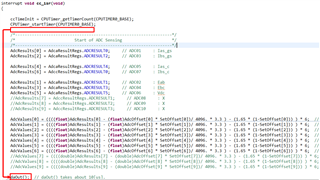Other Parts Discussed in Thread: C2000WARE
"I am involved in current control of an inverter, and I have created a code called 'daOut' to monitor internal variables. However, I have noticed significant differences in the current control characteristics when placing the 'daOut' code above and below the ADC register-related code inside the Interrupt Service Routine (ISR). In my understanding, I believe that the ADC-related code should take precedence at the beginning of the ISR. However, I have heard that some intentionally include dummy code before starting the ADC. Could you provide an explanation for this?


